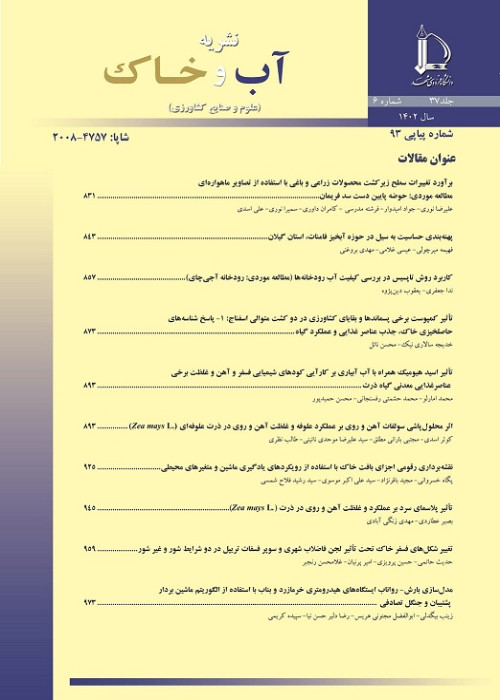Effect of Soil Properties Modifier on Physiological Responses of Lycium depressum Stocks to Drought Stress
The aim of the present study was to investigate the effect of soil conditioners on physiological responses (stomatal resistance, leaf temperature, chlorophyll, percentage of root colonization, carotenoids, proline) of Lycium depressum Stocks to drought stress. The experiments were performed in semi-controlled greenhouse conditions.
The experiment was conducted as a factorial experiment based on a completely randomized design including the main factor, irrigation at 4 levels (100, 75, 50 and 25% of field capacity) and the sub-factor of soil conditioners. In each combined treatment, 5 repetitions of irrigation and soil remediation and a total of 160 pots were used. Subsoil treatments including hydrogel and nitrobacter, mycorrhiza and zeolite were added to each pot. 500 cuttings of the target plant were planted in the greenhouse. The grown cuttings were transferred to the pots where the experiments were carried out. At each irrigation level, 40 pots containing 4 kg of vegetation soil of the target species were considered and the agricultural capacity (FC) of the target soil was determined in the soil laboratory. A total of 160 pots were placed in the greenhouse for testing. The main treatment of the experiment included irrigation levels (100, 75, 50 and 25% of the crop capacity) and sub-treatments of soil conditioners including Stacosorb hydrogel in the amount of 3 grams per kilogram of soil in each pot in the lower part of the plant roots. Zeolite with the industrial name of mineral zeolite (Mineral Zeolite) was added in the amount of 8 grams in each pot in the lower part of the root of the plant. Nitrobacter (a collection of strains of Azotobacter sp, Azospirillum sp and Bacillus sp with the brand name Nitrobacter Diane) was added to the amount of 3 cc in each pot in the upper region of the plant roots. Addition of mycorrhiza (the mycorrhiza used in this experiment was Glomus mosseae and was prepared as soil containing mosseae fungi) in the amount of 10 grams per pot in the lower part of the plant roots. After adding soil conditioners, irrigation was done according to the crop capacity in 4 irrigation levels, in the determined treatments.
Measurement of physiological characteristics showed different responses in each of the variables. Carotenoid changes in 50% irrigation showed the lowest value (p<0.05) and the control treatment without mycorrhiza showed the highest value in the measurement of chlorophyll and carotenoid at 100 and 75% irrigation levels. The results of measuring colonization percentage, stomatal resistance and leaf temperature showed the lowest value in 25% irrigation. In the control treatment, proline parameters and root colonization percentage increased under the influence of drought stress, and stomatal resistance parameters, leaf temperature and chlorophyll decreased under the influence of drought stress. With intensification of drought stress, chlorophyll and carotenoid contents of the plant increased and the amount of proline decreased in Nitrobacter treatment with mycorrhiza, which was significantly different from the control treatment. In the control treatment with mycorrhiza, with increasing drought stress, the leaf temperature increased and the amount of proline decreased, which was different from the control treatment. Aperture resistance decreased from 48 m2 / mol.s 100% irrigation level to 44 m2 / mol.s 25% irrigation, leaf temperature at 100% irrigation level in mycorrhizal-free hydrogel modifier from 26 ° C Decreased to 21.57 ° C in 25% irrigation, at 100% irrigation level in non-mycorrhizal zeolite modifier the amount of chlorophyll b + a from 0.6 mg / g to 1.20 mg / g in 25% irrigation increased. The amount of carotenoids at 100% irrigation level in zeolite modifier with mycorrhiza increased from 0.1 mg / g to 0.2 mg / g in 25% irrigation in control treatment with mycorrhiza at 100% irrigation level compared to the level Irrigation increased by 50% and root colonization by 1.5%. The amount of proline in mycorrhiza-free hydrogel treatment was measured at 100% 2.77 μmol / g irrigation and at 50% irrigation level 2.66 μmol / g. Reduction of proline at 50% irrigation level indicates that the hydrogel modifier has increased the resistance of Lycium depressum Stocks to drought stress.
The results of this study showed that the increase in drought causes changes in the physiological performance of the plant and the use of soil conditioners under drought stress due to the improvement of the physiological parameters, will increase the resistance of the plant by 50%. Nitrobacter treatments without mycorrhiza, hydrogel and zeolite with mycorrhiza and without mycorrhiza, due to further improvement of physiological parameters, is recommended to plants in nature.
- حق عضویت دریافتی صرف حمایت از نشریات عضو و نگهداری، تکمیل و توسعه مگیران میشود.
- پرداخت حق اشتراک و دانلود مقالات اجازه بازنشر آن در سایر رسانههای چاپی و دیجیتال را به کاربر نمیدهد.


